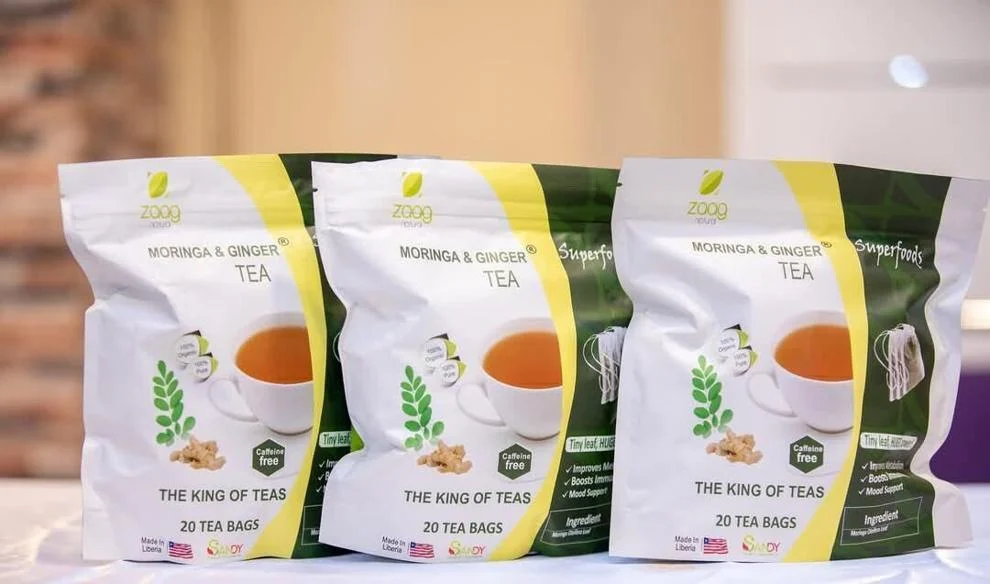Why Intellectual Property Protection Is Key to Business Growth
As Sandra’s experience proves: IP protection fuels business growth, fosters trust, enhances value, and unlocks expansion opportunities.
When Sandra Perkins-Lighe learned about intellectual property, she saw an opportunity not just to distinguish her business from its competitors but to gain consumer trust.
“Since we got trademark protection, sales have increased as trust in our Zaag Natural flagship products, moringa leaf powder and moringa & ginger tea, has surged," says Sandra.
"Customers, who once may have confused our product for a competitor's, can now recognize it instantly because of our trademark protections."
Sandra’s brand, Zaag Natural, is guarded by the trademark symbol Circle R (®), representing the authenticity of the Sandy Group of Companies’ products in the process. This recognition demonstrates the transformative power of IP, which does not just prevent copycats, but enhances a company’s value, attracts new investors, and provides consumers with a clear symbol of trust and authenticity.
Why is IP important for business growth?
IP, as a business and legal concept, grants businesses exclusive rights to their IP assets, thereby incentivizing growth in the process. This exclusivity ensures that businesses can reap the benefits of their efforts without the fear of unauthorized use or replication, which is important in maintaining market presence and competitive advantage. It is this concept that drives the global economy, as every hourly business revolves around IP, guaranteeing the constant delivery of quality goods or services. Without IP protection, the motivation for businesses to develop new products or services diminishes, potentially stifling progress and creativity.
As studies have shown, businesses that value IP protections scale up more easily compared to those that do not. Among the five different types of IP, trademarks, and trade secrets are key for any business looking to grow operations.
The former, as the first point of contact between a business and its customers, encapsulates the company's identity, values, and reputation — safeguarding the combination of symbols, names, and slogans.
In most countries including Liberia, trade marks last for 10 years, at which point it can be renewed for the same period, and so on.
What is most interesting is that a trademark forms part of a business’s property, which can be mortgaged, sold, or licensed to others, creating an additional income stream. This is why many companies permit third parties to use their registered trademarks in exchange for payments (licensing), enabling those parties to sell products or offer services in markets where the original business is not directly present.
An example of this practice is with Guinness Foreign Extra Stout. Although the brand is owned by Diageo, a multinational British alcoholic beverage company, it is brewed in Liberia under a licensing agreement with Monrovia Breweries.
As for trade secrets, they are the lifeblood of IP-driven businesses. They are confidential pieces of information that provide a business competitive advantage, such as formulas, processes, or proprietary methods. Thus, protecting trade secrets is the sole responsibility of the owner(s), as long as the information remains confidential and reasonable measures are taken to protect it.
Unlike any other forms of IP, trade secrets cannot be registered. Instead, they are safeguarded by maintaining confidentiality and implementing robust protective measures, such as non-disclosure agreements (NDAs) with employees and business partners, and restricting access to sensitive information.
An example of this with Coca-Cola’s unique formula, which remains a tightly guarded secret, guaranteeing that no competitor can replicate its iconic taste. Similarly, this applies to Sandra, whose company’s trade secret is being jealousy-protected, safeguarding its unique formula and processing methods.
How is IP Identified?
IP asset identification begins with recognizing the business's unique advantage. It could be an innovative product design, a distinctive logo, or perhaps a closely guarded recipe. Once the IP asset is identified, an inventory has to be taken, a process that ensures the value of the business is properly safeguarded.
Next is seeking professional guidance, as navigating the IP registration process can be daunting. Consulting with experienced IP attorneys is advisable. Once the registration process begins, early registration not only prevents conflict but also establishes a claim to the IP from the outset. This proactive approach is key to safeguarding the business IP assets.
The most important step of all is maintaining and enforcing the IP rights acquired. Owning a trademark is not enough—it must be actively protected. This requires regular monitoring of the market to ensure no one is infringing on the company’s rights. The key strength of IP lies in vigilance and the willingness of the rights holders to enforce ownership.
While these steps may be time-consuming, the lack of IP protection makes matters worse, as competitors can easily replicate a business effort without fear. This scenario can lead to a race to the bottom, where companies hesitate to innovate for fear that their ideas will be stolen. But when IP is secure, businesses can move forward with boldness.
It is this security that has emboldened Sandra, who is now planning to introduce infused teas into Zaag Natural’s product lines to address specific dietary needs. This kind of thoughtfulness is only possible because IP protection ensures that bright ideas are safeguarded and cannot be easily stolen.
According to the European Union Intellectual Property Office (EUIPO) studies, SMEs with an effective IP strategy enjoy a stronger negotiating position, achieve a greater success rate, and have a higher market value than those that do not.
 859
859










